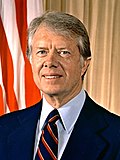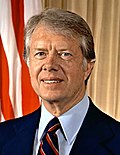1980 presidential election  | |
  Nominees Carter and Mondale | |
| Convention | |
|---|---|
| Date(s) | August 11–14, 1980 |
| City | New York, New York |
| Venue | Madison Square Garden |
| Notable speakers | Ted Kennedy Abe Beame Geraldine Ferraro Bruce Sundlun Ruth Messinger Thomas Addison Ed Koch Robert Abrams Bella Abzug Mario Biaggi Steve Westly Howard Dean |
| Candidates | |
| Presidential nominee | Jimmy Carter of Georgia |
| Vice-presidential nominee | Walter Mondale of Minnesota |
| Voting | |
| Total delegates | 3,346 |
| Votes needed for nomination | 1,674 |
| Results (president) | Carter (Georgia): 2,129.02 (63.63%) Kennedy (Massachusetts): 1,150.48 (34.38%) Carey (New York): 16 (0.48%) Proxmire (Wisconsin): 10 (0.30%) Others: 40.5 (1.21%) |
| Results (vice president) | Mondale (Minnesota): 2,428.7 (72.91%) Not Voting: 723.3 (21.72%) Scattering: 179 (5.37%) |
| Ballots | 1 |


The 1980 Democratic National Convention nominated President Jimmy Carter and Vice President Walter Mondale for reelection. The convention was held in Madison Square Garden in New York City from August 11 to August 14, 1980.
Contents
- Notable speakers
- Voting
- President
- Vice president
- The President's acceptance speech
- Platform
- Abortion
- See also
- References
- External links
The 1980 convention was notable as it was the last time in the 20th century, for either major party, that a candidate tried to get delegates released from their voting commitments. This was done by Senator Ted Kennedy, Carter's chief rival for the nomination in the Democratic primaries, who sought the votes of delegates held by Carter.




